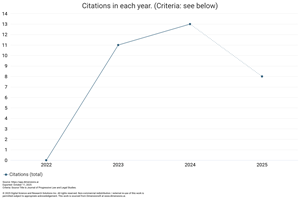Law Enforcement of Narcotics Abuse: Case Study of Investigation Process in Narcotics Criminal Acts in The Kolaka District National Narcotics Agency
DOI:
https://doi.org/10.59653/jplls.v1i02.150Keywords:
law enforcement, narcotics abuse, narcotics crime, investigationAbstract
Narcotics abuse recently has always increased, not only among adults but also among adolescents and children. The cause of this abuse consists of two factors, namely factor internal and external. Therefore, cases of drug abuse are increasing every year. This study was conducted with the aim to find out the form of law enforcement against narcotics abusers in the process of investigating narcotics crimes. The research method used in this study was normative juridical approach which is supported by empirical juridical by detailing the description and collecting primary data through interviews. The results of this study show that there are two forms of law enforcement against narcotics abusers, namely repressive law enforcement and rehabilitative law enforcement as regulated in Law Number 35 of 2009 concerning narcotics. Based on the interviews conducted, it is known that there are several obstacles in law enforcement on narcotics cases at the Kolaka National Narcotics Agency, namely the lack of personnel, the unresponsive community in providing information to investigators as the key to successful law enforcement and decreasing of operational costs in supporting facilities and infrastructure
Downloads
References
Agha H.S., Kristiawanto, Joko S., and Ramlani L.S. 2023. Law Enforcement of Criminal Actions About Narcotics Class I in The Criminal Justice System in Indonesia. World Bulletin of Management and Law. Vol. 20, pp: 21-25.
Anang Iskandar. (2020). Politik Hukum Narkotika, Kompas Gramedia (Pt Alex Media Komputindo), Jakarta.
Andriawan F., Maerani I.A., Sulchan A. (2021). The Process of Investigation Against The Criminal Action of Narcotics. Law Development Journal. Vol. 3(4), pp: 819-826.
Anton Santoso. (2017). Penerapan Hukum Pidana Narkotika di Indonesia. Adil:Jurnal Hukum, Vol. 8(1), pp: 137-161, doi:10.33476/ajl.v8i1.457.
A.R. Sujono dan Bony Daniel. 2012. Komentar Dan Pembahasan Undang-Undang Nomor 35 Tahun 2009. Bandung
Dafit Supriyanto Daris Warsito. 2018. Sistem Pemidanaan Terhadap Pelaku Tindak Pidana Penyalahguna Narkotika, Jurnal Daulat Hukum. Vol. 1(1).
Handrawan, Ali Risky (2022). Penyalahgunaan Narkotika Dalam Persfektif Teori Kriminologis (Studi Kasus Wilayah Hukum Kepolisian Resort Kolaka), DELAREV. Vol. 1(2), 133-146.
Hera Saputra, Munsharif Abdul Chalim. 2018. Penerapan Sistem Pemidanaan Terhadap Pelaku Tindak Pidana Penyalahgunaan Narkoba (Studi Kasus di Polda Jateng). Jurnal Daulat Hukum Vol. 1(1).
Herindrasti V.L.S, Drugs-Fee Asean 2015: Tantangan Indonesia Dalam Penanggulangan Narkotika, Jurnal Hubungan Internasional, Vol. 7(1), pp: 19-33.
Muhammad Syahrum, 2022. Pengantar Metodologi Penelitian Hukum Kajian Penelitian Normatif, Empiris, Penulisan Proposal, Laporan Skripsi Dan Tesis, Dotplus Publisher, Bengkalis-Riau.
Subagyo Partodiharjo. 2007. Kenali Narkoba Dan Musuhi Penyalahgunanya, Esensi, Jakarta
Downloads
Published
How to Cite
Issue
Section
License
Copyright (c) 2023 Basrawi Basrawi, Sukri Sukri, Riezka Eka Mayasari

This work is licensed under a Creative Commons Attribution-ShareAlike 4.0 International License.
Authors who publish with this journal agree to the following terms:
- Authors retain copyright and grant the journal right of first publication with the work simultaneously licensed under a Creative Commons Attribution-ShareAlike that allows others to share the work with an acknowledgement of the work's authorship and initial publication in this journal.
- Authors are able to enter into separate, additional contractual arrangements for the non-exclusive distribution of the journal's published version of the work (e.g., post it to an institutional repository or publish it in a book), with an acknowledgement of its initial publication in this journal.
- Authors are permitted and encouraged to post their work online (e.g., in institutional repositories or on their website) prior to and during the submission process, as it can lead to productive exchanges, as well as earlier and greater citation of published work (See The Effect of Open Access).
























